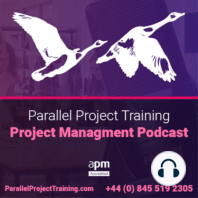13 min listen
APM PMQ (BoK7) Earned Value
ratings:
Length:
11 minutes
Released:
May 2, 2020
Format:
Podcast episode
Description
In this APM Project Management Qualification (BoK7) podcast, Paul and John discuss earned value. This podcasts aims to address the following APM PMQ assessment criteria; Explain why a project manager would use earned value management Interpret earned value data (including variances and performance indexes) Explain the benefits of using interpretation of earned value data This podcast is just part of the parallel learning system for the APM Project Management Qualification. This approach includes a wide range of learning resources including a printed study guide, on-line e-learning, a tutor lead study group and a wide range of project management courses Below is a transcript of this APM PMQ podcast: Introduction Welcome to a parallel project training APM project management qualification podcast based on the APM body of knowledge seventh edition. You should be using this in conjunction with our elearning podcasts, and potentially a tutor led course. For more information, please visit www.parallelprojecttraining.com Paul Hello, welcome to this Parallel Project Training podcast. Today we're looking at our favourite topic earned value. John Yes, hello, Paul – love earned value. Paul This is quite a big change in earned value for this syllabus. But anyway, let's go through the assessment criteria. Explain why project managers should use earned value, interpret and value data including variances and performance indices, expand the benefits of interpreting and value and expand the role of contingency planning and projects. So we're not doing any, we don't have to do the sums of calculating Earned Value anymore. John No, no. I mean, basically there is this new form of torture called interpret interpret. Yeah, so they give you a diagram and go or give you some numbers and you have to figure out what's going on. Yeah. You have to sort of synthesise, and you have to you have to look at those numbers and kind of read into them what could be going wrong on a particular project? Paul What you do quite often in a project environment Anyway, you go to a progress meeting. And someone hands a report to you as you go in the door. John Yeah, but I mean, if you got it if you've got a CPI of point eight, yes. I mean, interpret that. What does that mean? Well, that means that we're overspending on costs, we're really efficient. But that could be the result of billions of different reasons, you know, so I'm not, you know, we can go through few of them. But there might be many reasons why that's happening. Yeah. So there's not a definitive kind of List of these. But the essence of it is, is that you're working out some sort of, if you figure out your own value, right, that's what Paul Explain why a project manager should use earned value. Let's do that first John Okay, well, the principle is that you can't tell how well your project is doing simply by comparing what you've spent with what you thought you were going to spend. So you need another measure. So you need a third axis on your graph. So the curve on your graph, which is progress, progress is calculated. So the third the third act, the third curve is earned value. And that's calculated by taking the budget completion, multiply it by the percentage complete. Yes. So if you've got a war that's worth three grand, and you're two thirds of the way through, you've got 2000 pounds worth of earned value, putting it very crudely. So you plot those figures, you plot how much you spent, how much Earned Value you've got, and you compare the actual span of the plan costs with your own value, and that gives you indices and indexes and variances. It works on the basis that the only really good answer is your own budget, and you've delivered stuff according to the budget. So if there are no variances on earned value or actual costs, so that's the principle. So the consequence of that is that any deviation is bad. Yeah, even if it's positive, yes. Paul Is that we're not neces
Released:
May 2, 2020
Format:
Podcast episode
Titles in the series (75)
APM PFQ (BoK7) Business Case: Business Case by APM Project Management Training
